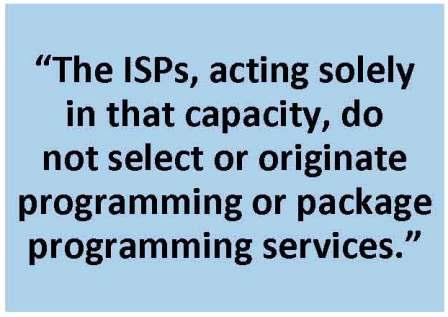
OTTAWA – The Supreme Court of Canada today confirmed a lower court ruling that internet service providers are not broadcasters and therefore not subject to the Broadcasting Act, nor the policies which have sprung forth from that law.
Back in 2009, the CRTC sent the question of whether or not ISPs are broadcasters to the Federal Court to decide, since many on the creative side of the industry insisted they are and should be contributing to the production of Canadian content passing through those wires or over those wireless waves. Plus, the Commission figured then that no matter what it decided about these “new media broadcasting undertakings”, it would have gone to court anyway.
In a very short decision released this (Thursday) morning, the Court dismissed the appeal led by ACTRA, the Canadian Media Production Association, the Writers Guild and Directors Guild of the lower court decision that also had confirmed that ISPs are not broadcasters since they merely transmit data and have no control over any programming.
“ISPs provide routers and other infrastructure that enable their subscribers to access content and services made available on the Internet. This includes access to audio and audiovisual programs developed by content providers. Content providers depend on the ISPs’ services for Internet delivery of their content to end-users. The ISPs, acting solely in that capacity, do not select or originate programming or package programming services. Noël J.A. held that ISPs, acting solely in that capacity, do not carry on “broadcasting undertakings,” reads the decision, referring to Justice Marc Noël, who wrote the lower court ruling.
“We agree with Noël J.A., for the reasons he gave, that the terms ‘broadcasting’ and ‘broadcasting undertaking’, interpreted in the context of the language and purposes of the Broadcasting Act, are not meant to capture entities which merely provide the mode of transmission,” the decision continues.

“Section 2 of the Broadcasting Act defines ‘broadcasting’ as ‘any transmission of programs … by radio waves or other means of telecommunication for reception by the public’. The Act makes it clear that ‘broadcasting undertakings’ are assumed to have some measure of control over programming. Section 2(3) states that the Act ‘shall be construed and applied in a manner that is consistent with the freedom of expression and journalistic, creative and programming independence enjoyed by broadcasting undertakings’. Further, the policy objectives listed under s. 3(1) of the Act focus on content, such as the cultural enrichment of Canada, the promotion of Canadian content, establishing a high standard for original programming, and ensuring that programming is diverse.
“An ISP does not engage with these policy objectives when it is merely providing the mode of transmission. ISPs provide Internet access to end-users. When providing access to the Internet, which is the only function of ISPs placed in issue by the reference question, they take no part in the selection, origination, or packaging of content. We agree with Noël J.A. that the term ‘broadcasting undertaking’ does not contemplate an entity with no role to play in contributing to the Broadcasting Act’s policy objectives,” it reads.
The creative coalition (the four groups mentioned above) expressed their collective disappointment in the decision. "The creative Coalition had argued… Parliament had always intended that the Broadcasting Act be applied in a technology neutral manner. In doing so, the coalition sought to ensure that the CRTC had the regulatory tools it needs to pursue the social policy goals under the Broadcasting Act," reads the coalition's release.
"The Coalition will continue to press for solutions to ensure that all those involved in broadcasting, including ISPs, have a regulatory responsibility to contribute to the Canadian broadcasting system."
– Greg O'Brien



